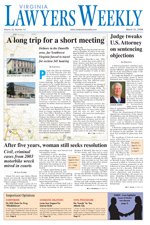To an experienced narcotics detective, a dollar bill folded in a certain way can only mean drugs. A defense lawyer tries to get the fact-finder to see other possibilities.
In Snell v. Commonwealth, police found a folded-up dollar bill in the wallet of a runaway kid. Unfolding the bill, which contained cocaine, was an unlawful search, his lawyer claimed. But the Court of Appeals, in an opinion written by Judge D. Arthur Kelsey, upheld the search.
Narcotics detectives are trained to recognize the “peculiar nature” of a tightly folded buck as a “characteristic method of packaging narcotics.”
Kelsey knows the value of a rhetorical device, and that a little hyperbole can go a long way. “In theory,” Kelsey wrote, someone might manipulate a dollar bill in this manner simply for the origami fun of it.”
But as a practical matter, the little bitty bill, together with the boy’s flight and his tossing something from his pocket, allowed the cops to unfold the bill and seize its cocaine contents.
Monday, March 26, 2007
Folded-up bill wasn’t origami; search upheld
Labels:
Court of Appeals,
Criminal Law,
Search and Seizure
Subscribe to:
Post Comments (Atom)

No comments:
Post a Comment